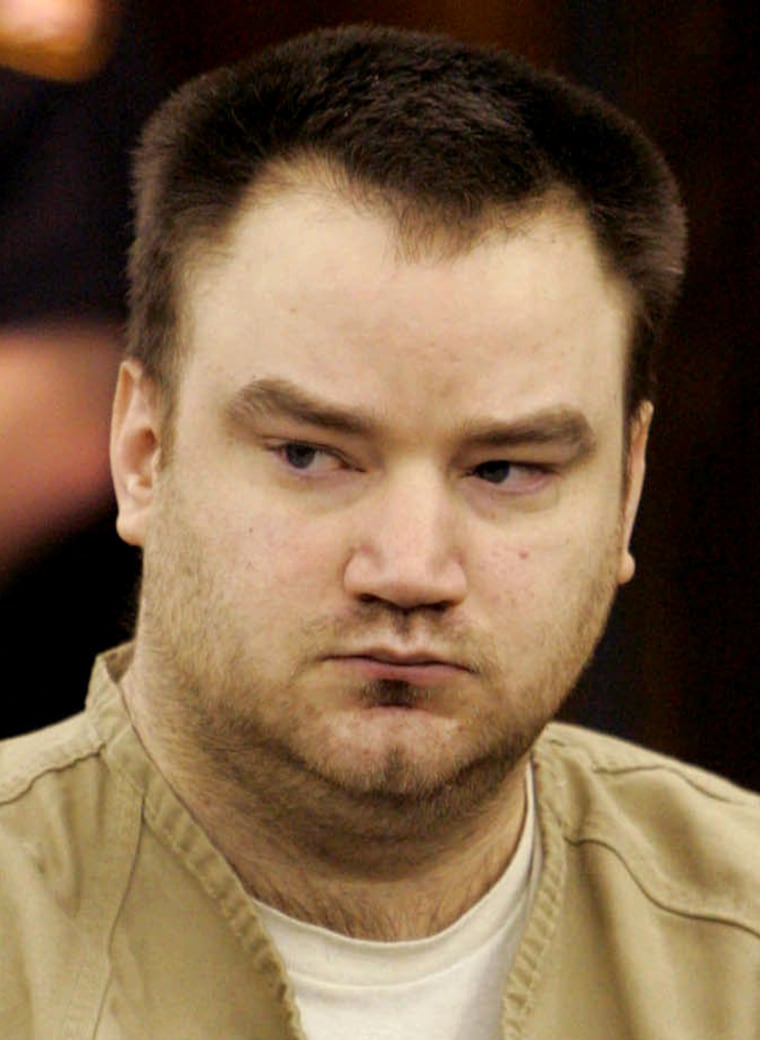A paranoid schizophrenic pleaded guilty Tuesday to involuntary manslaughter and 10 other charges in a series of Ohio highway shootings and was sentenced to 27 years in prison with no chance of being released sooner.
Charles McCoy Jr., 29, had admitted firing the shots in 2003 and 2004 to quiet mocking voices in his head but pleaded innocent by reason of insanity to aggravated murder and 23 other counts. His death penalty trial ended in a mistrial.
McCoy pleaded guilty to 11 counts, and prosecutors dropped 13 counts as part of the plea deal. He is not eligible for parole or early release.
McCoy sat quietly during the hearing before Franklin County Common Pleas Judge Charles Schneider and gave yes or no answers to many of his questions.
He broke down in tears as he began reading a statement of apology to the victims of the shootings, which lasted five months and killed the only person hit by a bullet. One of his lawyers, Andrew Haney, took over reading the statement, which McCoy had handwritten on a sheet of yellow paper.
McCoy had stopped taking medication
"I want to thank my family for their love and support, especially my mom," Haney read. "I'm sorry for not taking my medication and putting you and everyone through this." McCoy said he stopped taking his medicine because he was ashamed of his illness.
"I never knew or thought that by not taking my medicine, I would be able to do these things," Haney read.
McCoy, of Columbus, had told psychiatrists for both prosecutors and his defense that he threw wood and bags of concrete mix off highway overpasses and shot at cars to quiet voices in his head that called him a "wimp." Toward the end of the shootings, he believed firing from overpasses would make news coverage of Michael Jackson stop.
McCoy also cried as victims told Schneider how they had been affected by the shootings around the interstate encircling Columbus and nearby highways.
"We hate what you did to my mother and to all of us," said Brent Knisley, whose mother was killed. "I could stand here for hours listing all the things you did to my father, my wife, my brother, all of her friends and especially my two children, but you couldn't possibly understand because you didn't know her."
Frightened commuters changed their routes
Gail Knisley, 62, was killed Nov. 25, 2003, while a friend was driving her to a doctor's appointment before a day of shopping.
Her death alerted authorities to earlier linked shootings, and as buildings and more vehicles were struck, some frightened commuters changed their routes to avoid the southern end of Interstate 270 where Knisley died. About 77,000 vehicles daily travel the outerbelt encircling Columbus.
McCoy's parents said they hope their son can get treatment in prison.
"I would like to apologize to the community," said his mother, Ardith McCoy. "This was not our son who did this. Our son was a very sweet, mild-mannered person."
Haney said he has noticed a significant change in his client now that he is being medicated.
"He went from being profoundly disorganized to being a very sweet, very calm, very gentle young man. It's very sobering what happened to Charles," he said.
The first trial, which ended in May with the jury unable to decide whether he was insane, centered on whether McCoy's delusions kept him from understanding that the shootings were wrong. Prosecutors then decided not to pursue a death sentence.
If jurors had found McCoy insane in a second trial, he would have been committed to a mental hospital until a judge ruled he was no longer dangerous. Because of the severity of his disease and his longtime resistance to taking medicine — spitting pills out after his parents watched him take them — psychiatrists would have been reluctant to recommend releasing him in his lifetime.
Aware that his actions were wrong?
Psychiatrists for both sides agreed that McCoy had severe delusions that television programs and commercials were speaking directly to him and mocking him. But the prosecution's psychiatrist said McCoy showed he knew his actions were wrong by the steps he took to avoid capture, such as moving the shootings to other counties when publicity focused on I-270.
When McCoy's father called him to say police wanted to test his guns, McCoy gave permission, then drove 36 hours straight to Las Vegas. However, he didn't change his license plates — while the number was being broadcast nationwide — and registered under his own name at a motel. He was captured there after a few days, on March 17, 2004.
